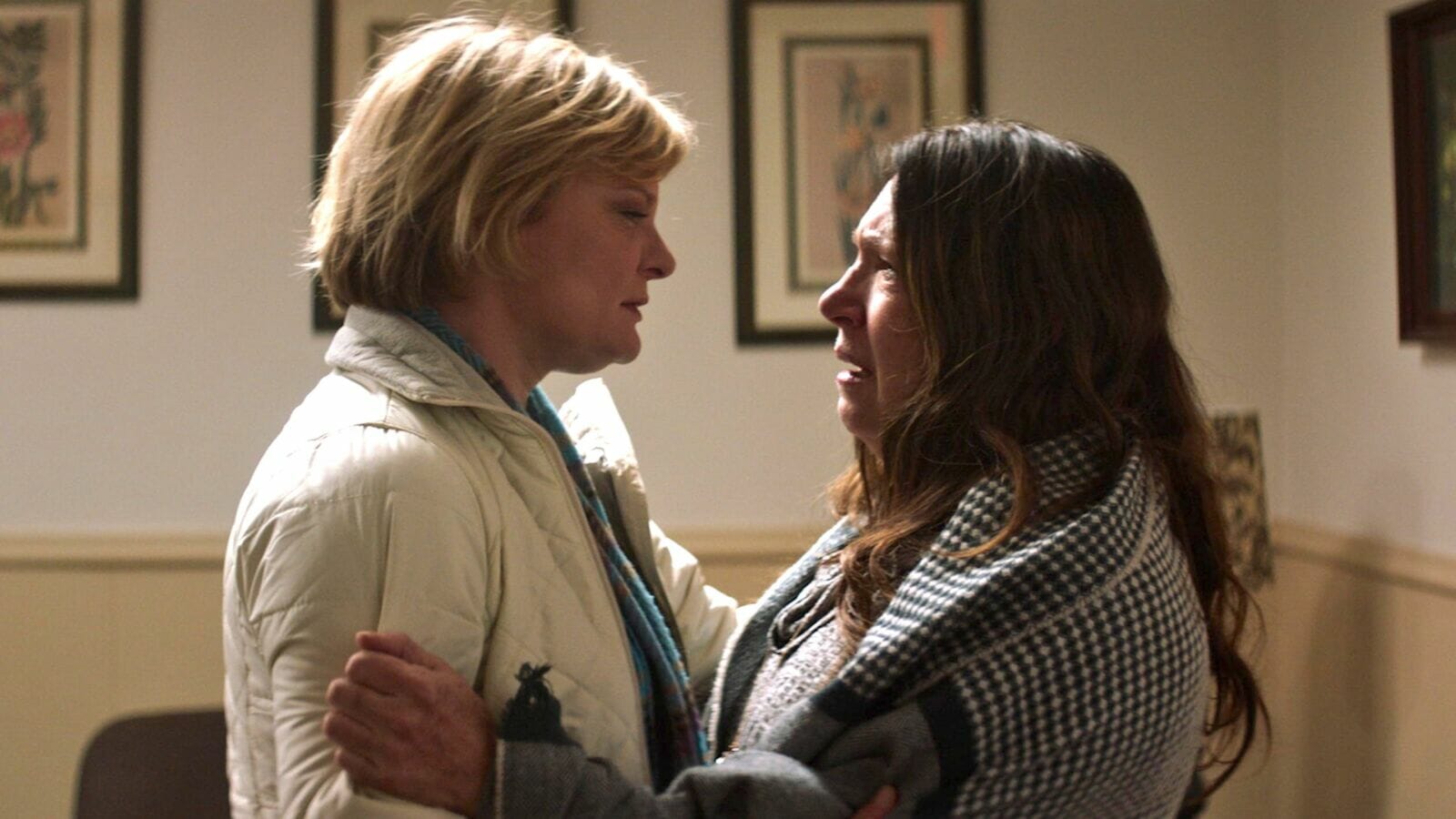The first 30 minutes of Mass are a masterclass in beating around the bush. The opening scenes are run-of-the-mill—volunteers set up a table and four chairs in the basement of an Episcopal church—but there’s a nervous energy in the air. The volunteers keep talking around the meeting they’re setting up, and even when their guests arrive, the reason for their presence goes conspicuously unsaid. Their reluctance to be there, however, is palpable. Having gone in blind, I’d never felt so tense over an event that I had zero information about.
First-time writer/director Fran Kranz (you may know him as the lovable stoner from The Cabin in the Woods) buoys the unease with a subtle formalist approach. The film is blocked like a stage production—it is a chamber piece, after all, rarely leaving the church basement—but the cinematic elements aren’t sleeping on the job. As the characters move from room to room, the camera tends to linger after they’ve left, gazing mournfully at spaces that were alive just a second ago. It’s like we’re hanging back with a ghost that hasn’t moved on yet. Editor Yang Hua Hu, cutting like he doesn’t want the shots to end, conjures up a wistful aura that fits the film’s subject before it’s even revealed.
After all the anxious buildup, the reveal of the premise lands like a punch to the heart. Two couples are there to discuss the loss of their sons: one was the victim of a mass shooting, the other was the perpetrator. The tragedy ripped both families apart. The two couples—Jay and Gail (Jason Isaacs and Martha Plimpton) and Richard and Linda (Reed Birney and Ann Dowd)—had been communicating by letter for some time, but after reaching points of no return in the grieving process, they felt they needed to meet face-to-face.
READ ALSO: Review: ‘No Time to Die’ is a worthy Bond movie
Their conversation is shot like a play and written like a whirlwind. Kranz’s screenplay is thematically ambitious to the point of being ethically fraught. Difficult subjects are strewn about with anger and candor: the deaths of children; the desire for revenge; the moral responsibility of parents; shame and anguish and guilt and blame. In lesser hands—even in talented hands, really—Mass could’ve been sensationalist and exploitative. But Kranz walks a very thin line very carefully to keep it respectful. The script fleshes out the couples so well that their positions feel justified even as they conflict. Mass is a feat of economical writing—it’s both a character study and a moral drama, and it never resorts to naked exposition to get either out of the way.
As attitudes get more heated, the camera lifts off its stabilizer and goes handheld, translating the loss of restraint to the visual dimension. Not that emphasis was needed—the crescendo of the conversation is enough. It’s too much, in fact: as the couples combust into broken vessels for their feelings, Mass starts to border on melodrama. It’s not that there’s a surplus of sentimental outbursts—they’re warranted and deftly built up to—it’s more an issue of how these outbursts resolve. For a film that wrestles with such impossibly hard subjects, it’s too willing to grant catharsis. It stresses the unsolvable problem of grief while building resolution into its very structure.
An early conversation is telling: before Jay and Gail enter the church, Gail anticipates that she won’t be able to “say it.” When the meeting’s goal is stated as healing for the couples, it becomes overwhelmingly clear what “it” is—the thing that Gail can’t bring herself to say to the parents of her son’s killer. The script is too forward in setting up Chekov’s forgiveness. The latter half of the conversation has a finger pressed eagerly on that trigger, and by the time “it” is said, the catharsis doesn’t feel earned so much as inevitable. It’s antithetical to the complexity with which Mass handled the situation previously. Messiness gives way to tidiness.
The performances go a long way toward staving off that transformation. Isaacs, Plimpton, Birney, and Dowd are all extraordinary, tunneling into the characters and themes to reach unprecedented depth. Mass may be deficient in some respects, but certainly not as an acting showcase. These are the kinds of performances that deserve to be studied. When Isaacs launches into a monologue about the specifics of his son’s death, his instability could tear the world apart.
The second that monologue ends, though, the film cuts to one of the few shots outside the church basement: a ribbon tied to a gate outside, ostensibly a memorial for the victims of the shooting. The shot ends the speech with a solemn yet definitive period. We return to the basement when the characters are ready to move toward resolution again—the venting part of the recovery process is over; now it’s time to move to the next step. In offering its characters such an orderly experience, Mass shrinks its hardest pills to sizes more swallowable. Still, this is only Kranz’s first feature screenplay. If his work further embraces the impenetrability of the human soul, there could be a masterpiece lying in wait.
★★★ (3/5)




